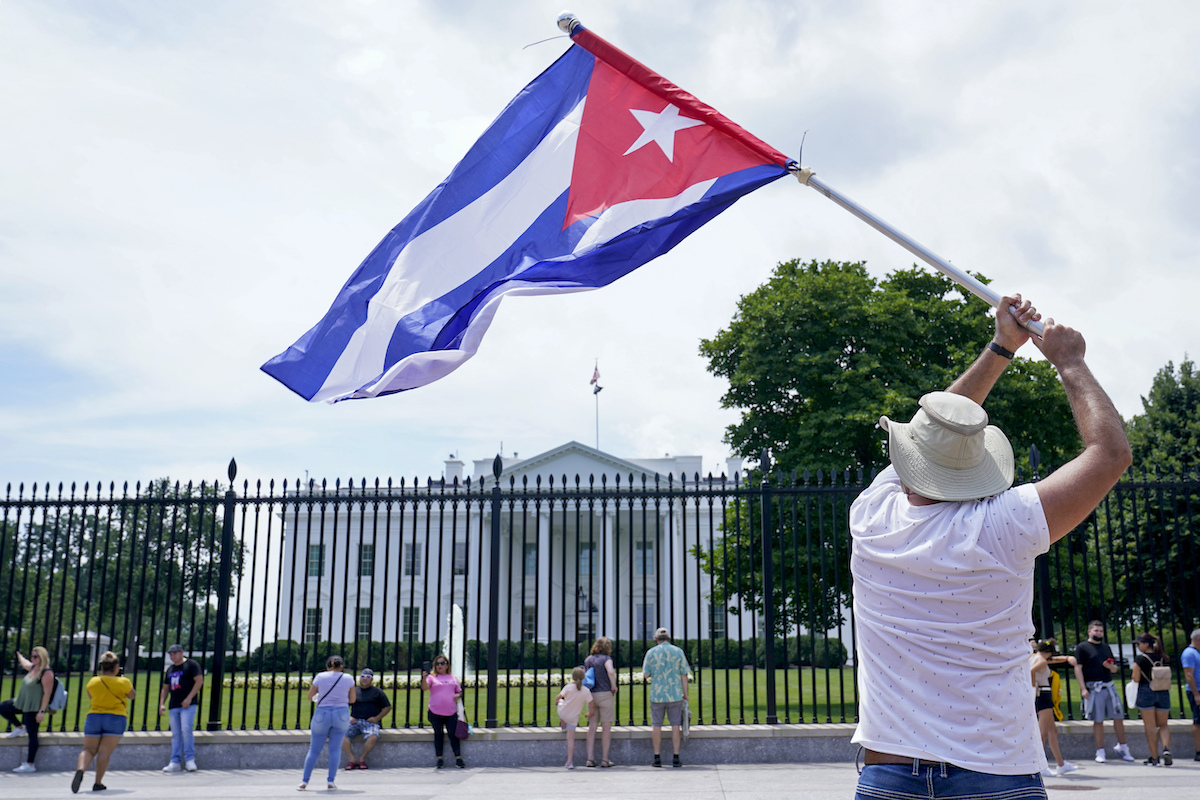

People participate in a rally outside the White House in Washington, Tuesday, July 13, 2021, in support of the protesters in Cuba. (AP Photo/Susan Walsh)
Following the widespread protests in Cuba on July 11 and calls for intervention and even regime change on the island, discussions about a post-Cuban Communist Party world have become more prominent.
Most of these current alternatives originate from the Cuban exile community, including the Partido del Pueblo (PDP). Alex Otaola — a Cuban-American actor, social media influencer, and political activist— created the PDP with the influence of Cuban dissidents like José Daniel Ferrer and former U.S. representative Lincoln Díaz-Balart. The objective of the PDP is to create a democratic system in Cuba with free markets, limited government, and neoliberalism.
The party’s slogan focus on the hopes of bringing about a more “just, free, and happy” Cuban society. Their actual government plans, if they were to become a reality, might result in the opposite.
The party itself takes its name from the historic Partido del Pueblo (Ortodoxos), led by Eduardo Chibas, a Cuban politician and radio broadcaster. Chibas hoped to run in the 1952 elections that saw the Batista dictatorship rise to power. He committed suicide shortly before that. However, he was a well-known figure within Cuban politics due to his strong stance against corruption and an ineffective Cuban state in the 1930s-1950s.
While Chibas was a self-described anticommunist, he believed that revolutionary action was necessary for Cuba. The Partido del Pueblo believed strongly in anti-imperialism and the nationalization of key industries that were foreign-owned, telecommunications, railways, and power plants, and economic and agricultural redistribution to break up the latifundia system and mono-crop agriculture—at the same time, maintaining support for political pluralism, private enterprises, and direct democracy.
After reading through the new PDP government plan, most social and economic commitments are done away with. Instead, they call for full resource exploitation of Cuba from national and foreign corporations through a complete liberalization of the economy. They state that there will be no government intervention in the economy and a corporate tax rate of 0% for five years.
The PDP also plans to allow any corporation or even Cuban exile up to three generations back to reclaim any lost property during the revolution, even if other Cuban citizens now use it. Likewise, they would do away with Cuba’s universal healthcare and education systems to be replaced by privatized ones. There will be no social security system on the island. Instead, the PDP expects humanitarian aid to be sufficient to fulfill the needs of the people.
This new Partido del Pueblo isn’t promoting regime change for the prosperity of Cubans on the island. Instead, it is geared for those who are exiles, descendants, and former corporate interests that would like to return Cuba to a 1952 state. An island that was only rich within its largest cities while experiencing high levels of poverty, illiteracy, and lack of hospitals and clinics in the rural parts of the nation. The same rural areas that were and are the lifeblood of the Cuban economy would be ripe for exploitation if their privatization occurs.
It is an alternative that wouldn’t work for Cuba.
***
Luis García Falcón is MA Student in Latin American and Caribbean Studies at Florida International University.


